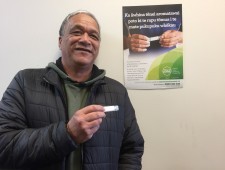Over 14,000 screening kits have been sent to Southern residents to date. 68% of the kits sent out in April and May have already been returned for testing, which is 6% higher than the national target (62%).
What’s more, 76% of kits sent to Māori residents have been completed and returned, which is an excellent result in terms of promoting equitable health outcomes for Maori living in the district (1).
Already, 34 cases of bowel cancer have been identified by the Programme, with means more than one case is being identified in the Southern district each week through bowel screening. “This is an awesome result for Southern residents, particularly for Māori, as well as their families, whānau and communities,” says Dr Jason Hill, Clinical Lead for the Southern Bowel Screening Programme.
“As well as being able to diagnose and treat early stage bowel cancer through the Programme, we’re also finding that many patients have polyps which can, over time, turn into bowel cancer. So, by removing them through the screening programme, we are going to help reduce further incidence of bowel cancer and have a massive impact on the future burden of bowel cancer in our district.”
Southern DHB attributes much of the Programme’s success to the way it has been embraced by the community, both with people coming on board as champions and supporters of the Programme, and through the network of health providers who have backed the Programme and helped to get the word out there about the benefits of participation. “The community has really got behind this programme in a huge way, and it’s amazing the difference this can make to the way it is received and embraced,” says Dr Hill.
Positive Result “No Drama” for one Invercargill Resident
Getting a positive result on a bowel screening test might send some people into a bit of a spin but not Mooney Ngatuere of Invercargill. After completing the test kit, Mooney, aged 62, received a phone call from his doctor asking him to come in immediately. “The results didn’t sound good,” recalls Mooney, “but I thought ‘No this is OK, it’s just a process I have to go through’.”
Shortly after his doctor’s visit, Mooney was scheduled for a colonoscopy at Southland Hospital. “The process was easy,” he explains. “The staff were talking to me throughout (the procedure), telling me where they were looking. They had a good look and said ‘No it’s really clean, you’re all clear’.”
After receiving a clean bill of health, Mooney will continue to be monitored in the future for any emerging bowel health issues. In the meantime, he’s encouraging others to take action and do the screening test. “Come on guys you’ve got to have this done. If you’re unsure about it, ring the freephone number or go and see your doctor, simple.”
People can find out more about the bowel screening programme by visiting timetoscreen.nz, or by calling freephone 0800 924 432.
(1) 76% of kits sent to Maori residents during April/May had been returned as of 1 November 2018.
